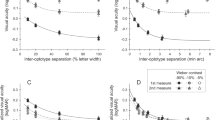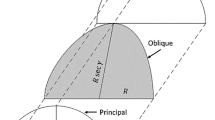Abstract
WHEN testing visual acuity with Snellen's current type, we use black letters printed upon a white ground, and the transition from black to white is as abrupt as can be. If the patient's eyes are emmetropic, or hyperopic without presbyopia, or myopic and corrected, the retinal image of the test remains sharp, and visual acuity is limited only by the structure of the retina and the aberrations of the eye. On the contrary, when the patient's eyes are myopic and not corrected, the retinal images are blurred and visual acuity is poor. This relation of visual acuity to ametropia has been studied by W. Swaine1 whose measurements one of us has shown to be in fair agreement with theory2. But further experiments Were necessary.
This is a preview of subscription content, access via your institution
Access options
Subscribe to this journal
Receive 51 print issues and online access
$199.00 per year
only $3.90 per issue
Buy this article
- Purchase on Springer Link
- Instant access to full article PDF
Prices may be subject to local taxes which are calculated during checkout
Similar content being viewed by others
References
Swaine, W., Trans. Opt. Soc., 27, 9 (1925–26).
Le Grand, Y., "Optique Physiologique", 251 (Ed. de la Revue d'Optique, Paris, 1946).
Author information
Authors and Affiliations
Rights and permissions
About this article
Cite this article
LE GRAND, Y., GUILLEMOT, E. Measurement of Visual Acuity with Blurred Tests. Nature 159, 132–133 (1947). https://doi.org/10.1038/159132c0
Issue Date:
DOI: https://doi.org/10.1038/159132c0
Comments
By submitting a comment you agree to abide by our Terms and Community Guidelines. If you find something abusive or that does not comply with our terms or guidelines please flag it as inappropriate.



